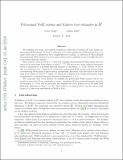Polynomial Wolff axioms and Kakeya-type estimates in R4
Author(s)
Guth, Lawrence; Zahl, Joshua
Download1701.07045.pdf (350.0Kb)
OPEN_ACCESS_POLICY
Open Access Policy
Creative Commons Attribution-Noncommercial-Share Alike
Terms of use
Metadata
Show full item recordAbstract
We establish new linear and trilinear bounds for collections of tubes in R4 that satisfy the polynomial Wolff axioms. In brief, a collection of δ-tubes satisfies the Wolff axioms if not too many tubes can be contained in the δ-neighborhood of a plane. A collection of tubes satisfies the polynomial Wolff axioms if not too many tubes can be contained in the δ-neighborhood of a low degree algebraic variety. First, we prove that if a set of δ-3 tubes in R4 satisfies the polynomial Wolff axioms, then the union of the tubes must have volume at least δ1-1/28. We also prove a more technical statement which is analogous to a maximal function estimate at dimension 3+1/28. Second, we prove that if a collection of δ-3 tubes in R4 satisfies the polynomial Wolff axioms, and if most triples of intersecting tubes point in three linearly independent directions, then the union of the tubes must have volume at least δ3/4. Again, we also prove a slightly more technical statement which is analogous to a maximal function estimate at dimension 3+1/4. We conjecture that every Kakeya set satisfies the polynomial Wolff axioms, but we are unable to prove this. If our conjecture is correct, it implies a Kakeya maximal function estimate at dimension 3+1/28, and in particular this implies that every Kakeya set in R4 must have Hausdorff dimension at least 3+1/28. This would be an improvement over the current best bound of 3, which was established by Wolff in 1995.
Date issued
2018-04Department
Massachusetts Institute of Technology. Department of MathematicsJournal
Proceedings of the London Mathematical Society
Publisher
Oxford University Press - London Mathematical Society
Citation
Guth, Larry, and Joshua Zahl. “Polynomial Wolff Axioms and Kakeya-Type Estimates in R4.” Proceedings of the London Mathematical Society, Apr. 2018.
Version: Author's final manuscript
ISSN
0024-6115
1234-5678